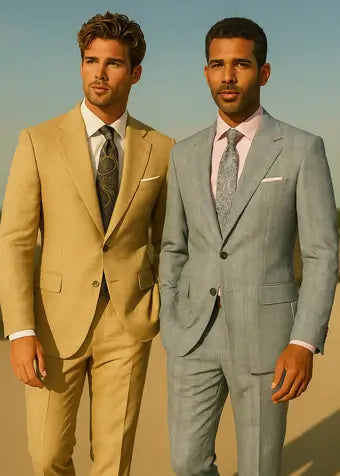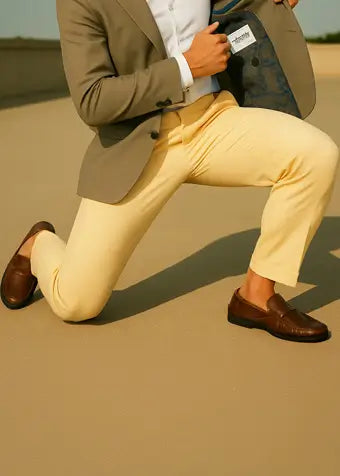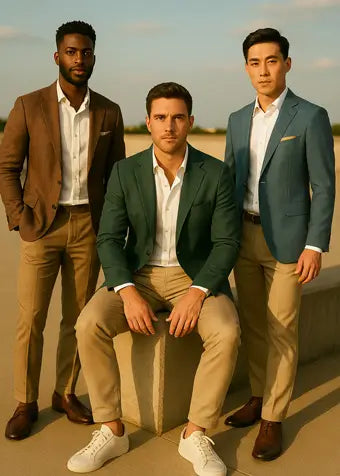Off-The-Rack vs. Made-To-Measure vs. Bespoke What’s The Difference?
Suits range widely in value, style and type. Off-the-rack, made-to-measure and bespoke are the commonly heard industry terms for three distinct manufacturing methods that determine, frankly, a lot about the quality of the final product. But what's the difference? Let's explore.
Off-The Rack
Off the rack (OTR) suits are mass-produced, which is how they’re able to be stocked in stores ready to be picked up "off the rack" and purchased immediately. From a fit perspective, OTR suits are the lowest rung on the fit totem pole. The fit is only as good as the customer’s body measurements line up with the model and grading methods used. Given the wide range of body types that exist, finding an OTR suit that fits your specific body type can be challenging, and each brand is typically quite different. Consider that to fit “more” of the population, OTR suits traditionally have a loose fit (even when “slim” cut).
Many OTR companies offer alterations that can be made during or after the purchase, either free or for an additional cost. Yes, altering an OTR suit will make the garment fit “better” - no question. However, results are limited as the alterations able to be made to a finished suit are limited. For many customers, unless the standard fit is already a close match, even an altered suit will be far from perfect.
Additionally, the construction quality of OTR suits is typically on the low end as cost-saving methods are employed to increase affordability. Fused canvasses, non-functional cuffs, extremely tight stitching (reducing mobility), single vents, highly synthetic fabrics (less breathable and less durable), and limited options are a few of the typical drawbacks. Small things like roll line tape, taped seams, and tapered shoulder pads are left out.
Bottom line - you get what you pay for. OTR suits are the most affordable and the quality reflects that.
Made-To-Measure
Made-To-Measure (MTM) suits are a "cut above" OTR. Suits are still crafted from predefined patterns, then altered as much as possible based on the customer’s measurements. This blend of a streamlined process while still allowing for order by order customization provides a nice mix of quality and fit.
The fit quality is improved from OTR as a slightly wider level of adjustments can be made before the suit is finished. However, MTM suits are still based on predefined patterns, so the nudge up from an OTR suit is limited. Customers with unique body types - short or long necks, high or low shoulders, excess girth, high hips, large or flat seats, etc - likely will still have unresolveable fit issues.
Construction quality varies widely on MTM but is generally better than OTR as mass scale production is not required to keep shelves stocked. The added cost of customization in the manufacturing process does often result in corners cut in areas where possible to streamline the process. Look for details on construction methods when reviewing the brand's website to understand better if they understand what goes on inside a high quality garment.
Bottom line - MTM is a good solution for most customers. The fit is better than OTR and the cost can still be affordable.
Bespoke
Bespoke suits are the holy grail of suit manufacturing. Cut from a pattern created from scratch to the customer's unique measurements, the bespoke fit is second to none. The limiting drawback is that this approach requires significantly more labor, mass production is not feasible, and consequently bespoke suits are usually far more expensive than OTR and MTM.
A great fit comes from a great understanding of the customer’s body type. Numerous measurements and information about stance, shoulder slope, chest shape, and more are harmonized together into patterns that create a silhouette to perfectly canvass the wearer's body, bringing out the best in their unique features. With this unique level of attention given to each suit, construction quality is typically of the highest caliber as well - after all, why short change construction when going to such lengths for fit?
Bottom line - bespoke suits are the creme de creme of suits, but they almost always come with a premium price tag. If you can afford bespoke, you won’t regret it. If not, MTM offers a quality fit - and either is a big step up from OTR.
Do affordable bespoke suits exist?
While the price for true bespoke suits typically starts above $1500. However, companies like Sartoro are making high quality bespoke suits affordable for all. How? Two ways
1. Eliminating expensive storefronts and streamlining the measurement process online.
Without any physical stores, costs are lower and less markup is required to cover expenses. When you walk into a high-end suit store in NYC, you better believe a big portion of the cost you’re paying is for the exorbitant rent, the plush leather couches, the single malt scotch you sip during fittings, and all the staff. If you're buying a suit for the experience of doing so, go for it. We took a different approach.
Traditionally, getting measured accruately required (sometimes multiple) visits to a master tailor. Not anymore. Sartoro's Digital Tailor predicts your body measurements within 3% accuracy - no tape measure required.
2. By opting for reasonably priced premium fabrics instead of ultra-expensive super premium blends.
The price of fabrics range widely, as does the quality. Premium quality fabrics are becoming commoditized, and are now able to be produced at high quality by smaller independent mills around the world. Super premium fabrics from traditional mills in Italy may well be superior, but 98% of the population can't tell the difference without very close examination. The price difference can be extraordinary. While a premium fabric from an unknown mill might be $10-$20 per meter, super premium fabrics can run as high as $200-$300 per meter.
So when you're considering your next suit, head over to www.sartoro.co and start designing yours.

































